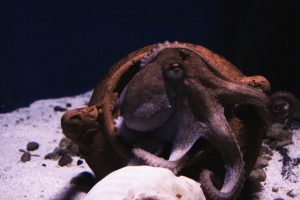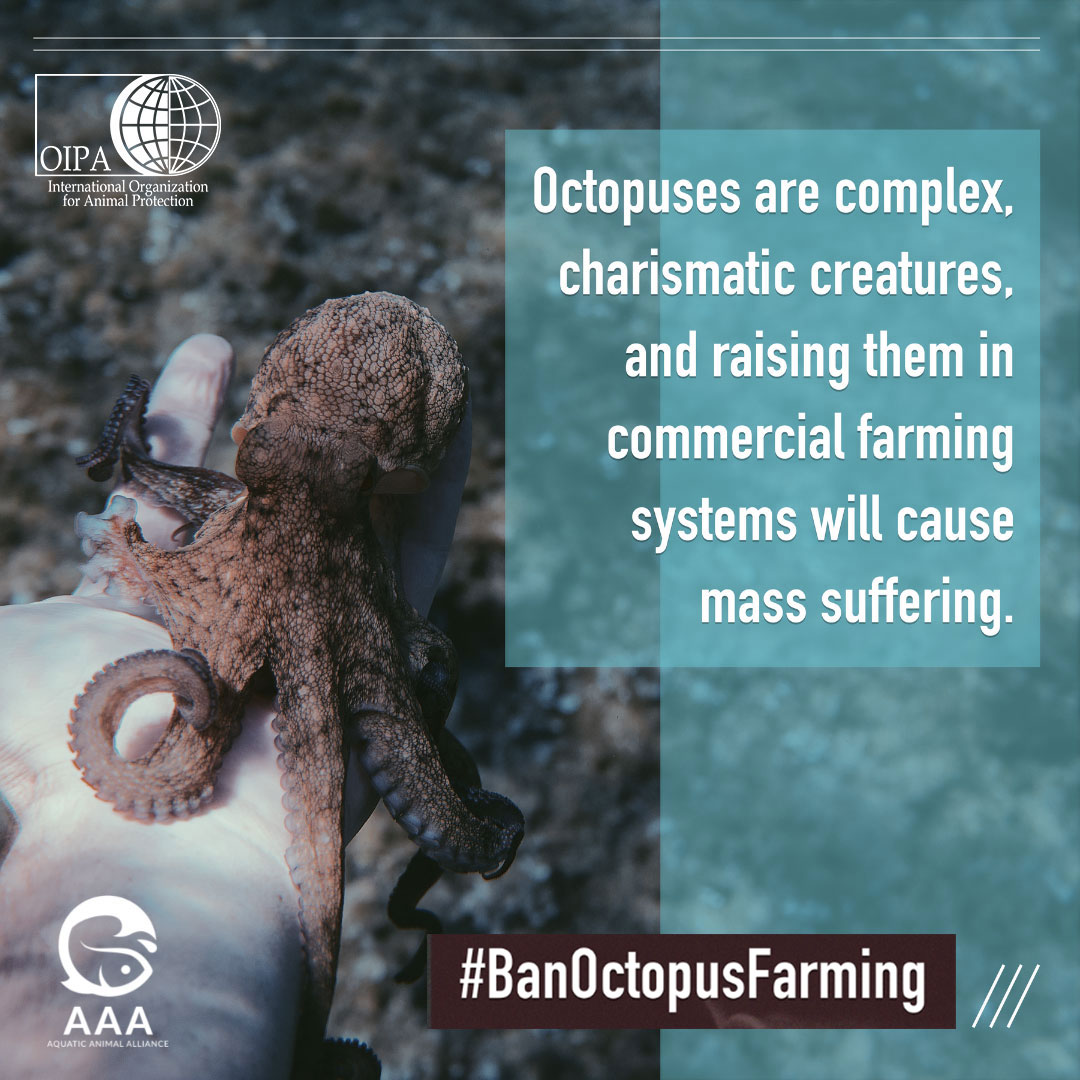BAN OCTOPUS FARMING
OIPA became member of THE AQUATIC ANIMAL ALLIANCE (AAA), a coalition of fish welfare experts and advocates focused on improving and protecting the lives of fish and other aquatic animals. AAA has launched the #BANOCTOPUSFARMING campaign with the goal to block breeding and rearing of octopuses in captive environments for the commercial sale of their meat.
After the Spanish company Nueva Pescanova, a global seafood giant, has invested €65 million to build the world’s first commercial octopus farm in Las Palmas, Gran Canaria, Canary Islands, high ethical and environmental concerns arose among animal welfare associations and scientists, generating at the same time indignation from the public across the globe. Recently, another Spanish seafood company is also planning to enter the market to develop octopus farming factories.
Intensive aquaculture became unfortunately part of the global food system in the latter half of the twentieth century and is now one of the fastest growing food industries. Approximately 550 different aquatic animal species are raised in captivity in nearly 190 countries. Farmed aquatic animals now constitute half of the seafood market in many industrialized countries. As with terrestrial animals, the intensive farming of aquatic animals is associated with animal welfare and environmental concerns. Fish kept in captivity develop traits not seen in the wild and tend to be more aggressive, experience more chronic stress and injury, and contract more diseases.* The environmental impacts of aquaculture include pollution from nitrogen and phosphorus released from feces and food decomposition; contamination from fertilizers, algaecides, herbicides, and disinfectants; excessive use of antibiotics; interbreeding and disease transmission between escaped fish and wild varieties; and loss of natural habitat.
(* The Case Against Octopus Farming, by jennifer jacquet, becca franks, peter godfrey-smith, walter sánchez-suárez https://issues.org/the-case-against-octopus-farming/)
LEARN MORE ABOUT OCTOPUSES

Octopuses stand out among invertebrates for their complex anatomies and behaviour, and remarkable intelligence. They are truly extraordinary aquatic animals, with charismatic and curious personalities, capable of problem-solving, mimicking their surroundings using colour changes that take place on a scale of seconds, outwitting predatory sharks, discriminating individual humans, engaging in playful behaviour, and hunting in response to cooperative signals sent by fish. They are also sentient, solitary, and fragile animals, thus we have the moral imperative to treat them with high regard.
They are classified as cephalopods and they have three hearts. Their two peripheral hearts pump blood through the gills, where it picks up oxygen. A central heart then circulates the oxygenated blood to the rest of the body to provide energy for organs and muscles.
Octopuses exhibit cognitive and behavioural complexity, and they appear capable of experiencing pain and suffering. The neuroscientists who wrote the ‘2012 Cambridge Declaration on Consciousness‘, considered to be the first formalization of the scientific consensus about the consciousness of several nonmammal species, singled out octopuses as the sole invertebrate capable of conscious experience (although it remains possible that other invertebrates might also be sentient). Widespread observations of octopus as curious and exploratory creatures have been confirmed by experimental work. Once octopuses have solved a novel problem, they retain long-term memory of the solution. One study found that octopuses retained knowledge of how to open a screw-top jar for at least five months. They are also capable of mastering complex aquascapes, conducting extensive foraging trips, and using visual landmarks to navigate.
There are approximately 300 species of octopuses, more than 100 of which are captured in the wild using nets, pots, lines, and traps.
THE DARK SIDE OF OCTOPUS FARMING
Octopus farming poses severe threats to octopuses and the environment. Nueva Pescanova’s plans involve confining these naturally solitary creatures in crowded conditions with constant light, accommodating 10-15 octopuses per cubic meter of tank space. Their inhumane killing method involves immersing octopuses in a near-freezing ice slurry (-3°C water), causing a slow and painful death.The shocking method of killing these sentient beings has now been revealed.
Environmental concerns include nutrient-rich water from the farm being pumped directly into the ocean and the massive amounts of ground-up fish such as crabs, squids and hake needed to feed the captive octopuses, being carnivores. This unsustainable practice requires the death of 9kg of fish for every 3kg of octopus farmed. This will exacerbate the global fishing crisis by depleting ocean communities and damaging delicate marine ecosystems. Ecosystems that are close to fish farms suffer many adverse effects.
Octopus farming poses severe risks to the health of humans and other animals. Octopuses can suffer from up to 20 different pathologies, including Vibrio Cholerae, which causes the cholera disease in humans.
The European Union’s Farm-to-Fork strategy seeks to promote a more sustainable food system, and this farm will worsen the climate crisis and environmental degradation.
Research on octopus in farmed settings has demonstrated cannibalism and aggression (Pham, & Isidro, 2009), parasitic infections (Ladineo & Ozić, 2005), and problems with digestion (Sykes et al. 2017).
(*Source: Plant Based Treaty)
THREE REASON WHY YOU SHOULD SUPPORT THE CAMPAIGN
- OCTOPUS FARMING IS UNETHICAL

As an invertebrate with the most advanced brain, the octopus is the poster child for aquatic animal sentience and intelligence. The octopus has long-term memory, capable of retaining information and recognizing individual people. The octopus carries out extensive foraging trips, and uses landmarks to navigate the course. To raise them in captive breeding environments with no cognitive stimulation, and denying them freedom to carry out natural behaviours, is morally misguided. Their unique cognitive abilities and solitary nature of octopuses make large-scale farming an unimaginable and barbaric practice. Their decentralized nervous system and protean body enable them to perceive and experience the world in a highly dynamic way, which would be severely limited in a confined farming environment. Moreover, their inherent preference for solitude would lead to increased stress and potential aggression when kept in close proximity to each other.
- OCTOPUS FARMING WILL HAVE MAJOR ENVIRONMENTAL CONSEQUENCES
 Octopuses are carnivores, requiring aquatic animal protein in their diets, thus farming them will further deplete fish stocks. An octopus’ food conversion ratio is approximately 3:1, so the weight of feed to sustain an octopus is around 3 times its weight. Nitrogen and phosphorus waste will be a product of the octopus farms, as will contamination from fertilizers, algaecides, herbicides, and disinfectants. It is also possible that diseases will spread from the farms to the wild environment, and aquatic animals living in those environments.
Octopuses are carnivores, requiring aquatic animal protein in their diets, thus farming them will further deplete fish stocks. An octopus’ food conversion ratio is approximately 3:1, so the weight of feed to sustain an octopus is around 3 times its weight. Nitrogen and phosphorus waste will be a product of the octopus farms, as will contamination from fertilizers, algaecides, herbicides, and disinfectants. It is also possible that diseases will spread from the farms to the wild environment, and aquatic animals living in those environments.
- BECOME AN ADVOCATE FOR THESE EXTRAORDINARY ANIMALS – TAKE ACTION!
 – Share our campaign and take the actions we support:
– Share our campaign and take the actions we support:
– Post on social media using the tag #BanOctopusFarming and #StopOctopusFarming and include relevant authorities
– Pledge to boycott and not visit The Canary Islands until the octopus farm proposal is dropped and octopuses are recognised as sentient beings in Gran Canaria (Animal Save Movement)
– Send an email and Urge the authorities in the Canary Islands to refuse the permit for Nueva Pescanova to build an octopus farm in Las Palmas, Gran Canaria (Plant Based Treaty)
– Tweet against octopus farming in Mexico
– Sign the petition against octopus farming in Mexico (Vegetarianos Hoy)
– Endorse the Plant Based Treaty
OUR TOP PRIORITIES
- Pursue a legislative ban on octopus farming in multiple countries
- Ensure farms are not permitted to begin operations
- Work with retailers to ban the procurement of farmed octopus
- Collaborate with certifiers on banning octopus farming as a certifiable practice
Read more on: ali.fish/octopus-farming-ban

USEFUL INFORMATION
- Why Cephalopod Farming Must be Rejected Before it Starts
- Banding Together to Ban Octopus Farming
- Letter to UNDP
- Written Testimony Submitted to Washington House Committee of Agriculture and Natural Resources
- Jennifer Jacquet – The Case Against Octopus Farming
- The Octopus Mind and the Argument Against Farming – Animal Sentience
- Watch Seaspiracy, My Octopus Teacher and Blue Planet
- Five Interesting Facts about Octopus
- Endorse the Plant Based Treaty



